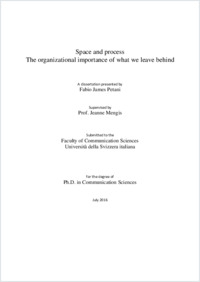Space and process : the organizational importance of what we leave behind
- Petani, Fabio James
- Mengis, Jeanne (Degree supervisor)
-
27.10.2016
166 p.
Thèse de doctorat: Università della Svizzera italiana, 2016
English
Organizational research recently advocated an attention to space (Kornberger & Clegg, 2004), examining how space both produces and is produced by complex relationships of materiality, identity and power (Dale & Burrell, 2008). This literature widely turned to the founding book The Production of Space by Henri Lefebvre (1991/1974) to show how organizational practices resist (Wasserman & Frenkel, 2011), or are enchanted by (Hancock & Spicer, 2011) particular corporate architectures. Research on the role of spatial legacies (De Vaujany & Vaast, 2013), showed how corporate spaces of the past are differently remembered over time to signify the solidity of evolving intentions (Decker, 2014). These studies well capture how practices transform previously planned and already existing spaces, charging them with different meanings after construction. Less we know about how space is produced before and during the phases of organizational planning and construction. Tracing sacrificed planned spaces and missed compromises, I inquire into what is left behind in the discursive and material testing processes that excluded alternative possibilities. A first part of this dissertation focuses on the role of history and remembering in space planning practices. I empirically analyse the narratives surrounding the planning of an important culture centre. The introduction of the concept of lost space specifies how urban planning organizes sociomaterial and spatiotemporal narratives of loss to articulate the need to regain certain spaces (and not others) and design a continuity with a selected past that should not be left behind. Lost space allows planners to narratively “remember the future”. This section contributes a processual interpretation of the interplay between Lefebvre’s (1991/1974) three moments of conceived, perceived and lived space, through a processual focus on conceiving (i.e. planning). By reviewing Lefebvre’s work on everyday temporality (2004/1992, 2014a) and history (1970, 1975), I balance an organizational analysis of space with a sensitivity towards time and remembering. A second part of this dissertation engages in a theoretical discussion and empirical illustration of the representational problem of space and time, which pervades organizational literature and practices. I review longstanding debates on the spatialization of time (Bergson, 2001/1889) and on the principle of simple location, calling for a more space-balanced approach to phenomena in process organization studies. The attention process studies devote to temporality (Helin, Hernes, Hjorth & Holt, 2014; Langley & Tsoukas, 2010, 2016) risks not accounting adequately for space. I suggest space as a processual dimension inseparable from time, and while calling for spatiotemporal representations of space’s plural simultaneity of durations (Massey, 2005), I warn on the need to address the performativity of conflicting organizational representations of space. Space-time integrated representations can account for the complex web of multiple lived organizational dimensions, and process organizational analysis is well positioned to analyze the performativity of all spatial representations. This section addresses different assumptions of time and space by illustrating, through empirical examples, how opposed (dynamic or static) representations of space performed change in construction management practices. The third paper of this dissertation addresses the topic of how values pragmatically justify spaces under construction. Coordination practices and conventions in construction management involve the skillful trade-off process of testing and compromising, with a retrospective reasoning on the sacrifices incurred to grasp how costs could have been (and could still be) avoided. By analysing the composition of values through a new methodology that traces in various data sources the abstract and pragmatic construct of what could have been, the study contributes a processual interpretation of the economies of worth (EW) framework (Boltanski & Thévenot, 2006/1987). Challenging the equilibrium assumptions of sacrifice underlying the value-based action framings of the EW, the core organizational and managerial sacrifice of compromising extends the model’s horizon of critique and uncertainty. I review the growing organizational literature on EW compromises. The analyzed interplay of tests and compromises in everyday building site controversies shows how coordination conventions act together and relationally over time, across different situations, shaping the actors’ critical awareness of the possibilities unduly left behind.
- Language
-
- English
- Classification
- Social sciences
- Notes
-
- Summa cum laude
- License
-
License undefined
- Identifiers
-
- RERO DOC 278192
- URN urn:nbn:ch:rero-006-115755
- ARK ark:/12658/srd1318477
- Persistent URL
- https://n2t.net/ark:/12658/srd1318477
Statistics
Document views: 406
File downloads:
- Texte intégral: 354
